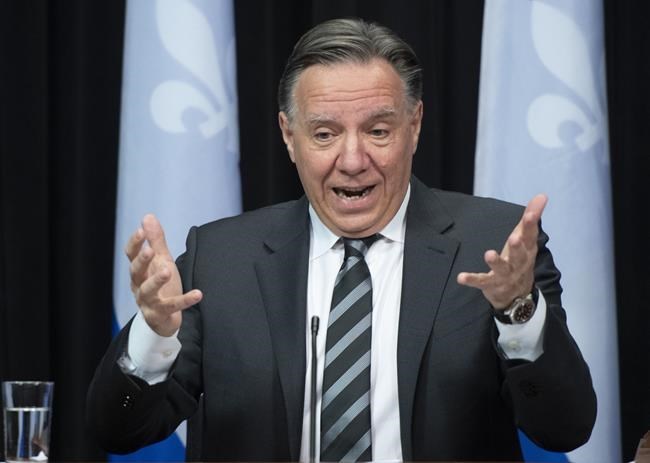MONTREAL ŌĆö The Quebec government intends to lift most public health measures by March 14, Premier Fran├¦ois Legault said Tuesday, but the plan doesn't include an end to mask mandates or the vaccine passport system.
Legault presented a road map that begins on Saturday, when all limits on indoor private gatherings will be removed. He said his plan represented a return to a more normal life, nearly two years after he declared a state of emergency due to COVID-19.
"The Health Department and the public health teams believe that it is a calculated risk today to announce a deconfinement plan to you," Legault told reporters in Quebec City. "So, I think we've taken an important step."
Just two weeks ago, Legault had advocated a go-slow approach. Dr. Luc Boileau, the province's interim public health director, said Tuesday that the government's strategy hasn't changed.
"For us, it's still gradual and it's likely that what is proposed here will hold firm, but it's still gradual," Boileau said.
COVID-19 hospitalizations have dropped by more than 1,000 within the last three weeks to less than 2,400. And while hospitalizations could rise as measures are relaxed, officials are confident the health system has enough flexibility to deal with cases, Legault said.
"Obviously, we are saying it more and more ŌĆö we will have to learn to live with the virus," Legault said. "What does this mean? This means that each person will have to, individually, assess their risk."
By Feb. 21, entertainment and sports venues can open at 50 per cent capacity and fully reopen with no limits on Feb. 28. The Bell Centre, home of the Montreal Canadiens, can reopen fully on March 14. Bars and casinos will reopen as of Feb. 28 at half capacity and increase to full capacity by mid-March, along with restaurants. Karaoke and dancing inside bars and restaurants will also be permitted once again as of mid-March.
Also on Feb. 28, working from home will no longer be mandatory.
Legault said the thousands of demonstrators who descended on Quebec City over the weekend calling for an end to health measures didn't weigh on the government's decision to offer Quebecers a reopening plan on Tuesday.
"Now, if they (demonstrators) want to take credit for this, and then they don't come back in two weeks, I won't object to that," Legault added, referring to promises from protesters to return to the provincial capital.
News of the government's road map was well received from different stakeholders after two years of successive shutdowns.
"The pace is slow, but we finally have predictability," Michel Leblanc, president of the Chamber of Commerce of Metropolitan Montreal, said on social media. "The government must now ensure that the economy will no longer be reconfigured to protect a failing health system."┬Ā
Boileau said there are no immediate plans to remove mask mandates in schools or elsewhere, saying masking remains an effective way of cut transmission. That decision will be revisited after March 14, he added.┬Ā
Health Minister Christian Dub├® said authorities will take a similar approach with the vaccine passport and revisit the issue later. Quebecers are required to show proof of vaccination to enter many businesses, such as big-box stores, as well as liquor and cannabis stores.
It's likely those tools ŌĆö masking and the vaccine passport ŌĆö will remain at the government's disposal when Dub├® tables a bill in the legislature next month that will detail which emergency measures the government intends to keep.
"I don't want to be the prophet of doom here, but if we're in September, there's a sixth wave, for sure the vaccine passport will be part of the tools we need, like the mask," Dub├® said.
Quebec reported 56 more deaths linked to COVID-19 Tuesday and a 45-patient drop in COVID-19 hospitalizations, for a total of 2,380 patients, including 178 in intensive care.
This report by The Canadian Press was first published on Feb. 8, 2022.┬Ā
Sidhartha Banerjee, The Canadian Press


